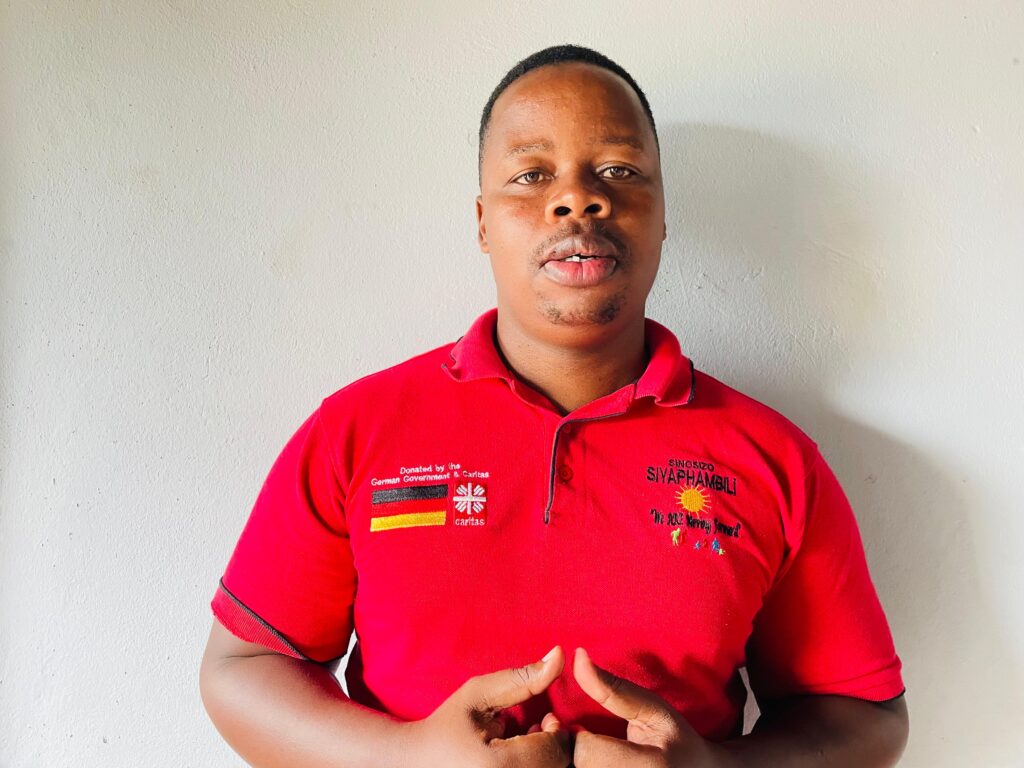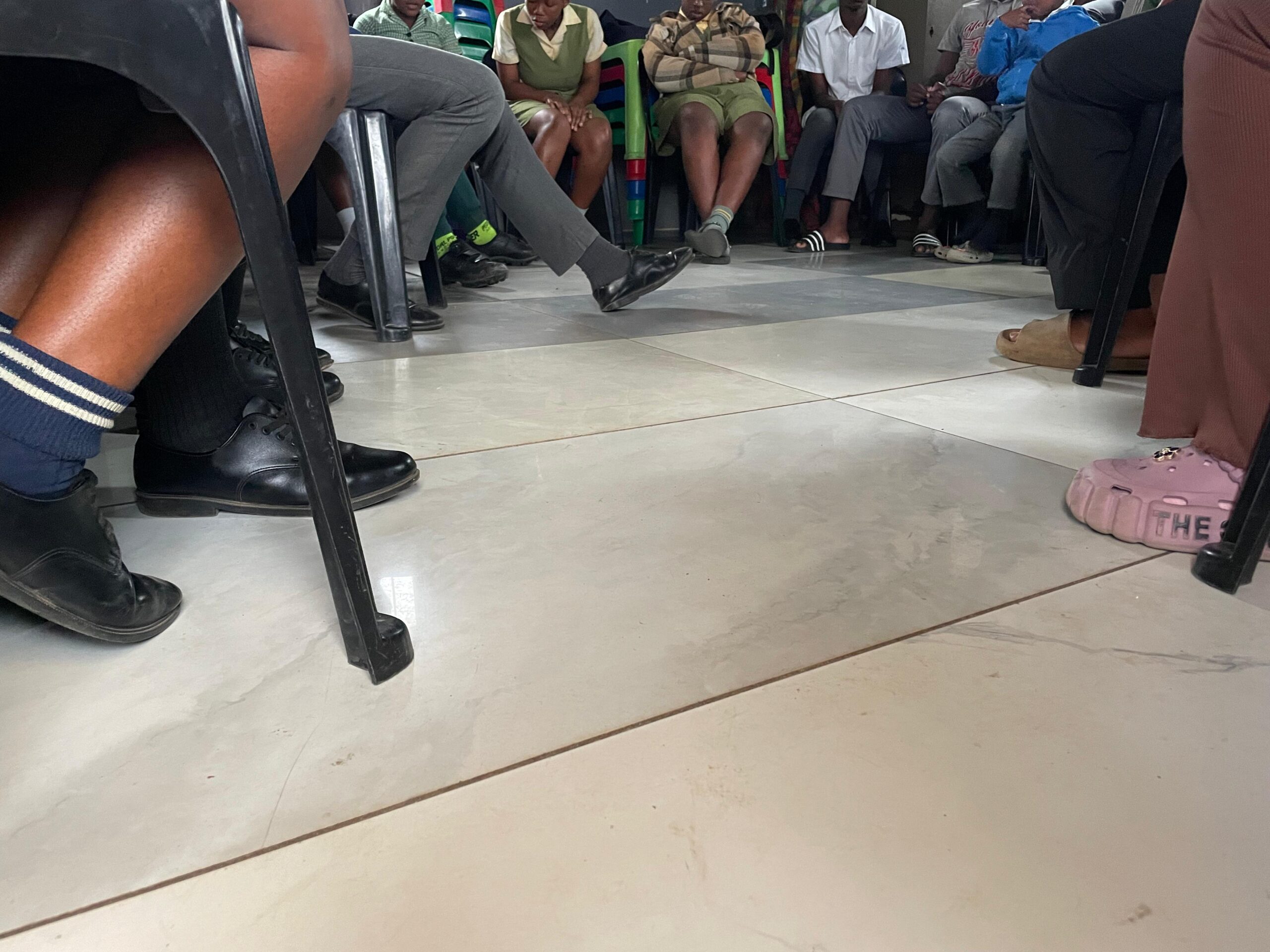In this final instalment of a three part series looking into the burning issue of hunger in schools Mokgadi Mogy Mashako tells the story of how such experiences shaped one man’s mission
When Nhlanhla Mdluli looks into the eyes of hungry learners today, he sees the reflection of his 11-year-old self — a boy who walked an hour and a half from home in rural Stanger, KwaDukuza, on an empty stomach, waiting for 10 am break.
“When you get to school, sitting in a class waiting for 11 o’clock break, you can’t concentrate when you are hungry,” he says.
The Global Report on Food Crises (2025)warns that nearly 300 million people worldwide are trapped in food insecurity or worse — with children in sub-Saharan Africa among the most affected. In South Africa, the crisis takes on a familiar face: the child in uniform who studies on an empty stomach.
Now 37, and a youth coordinator for the Sinosizo Siyaphambili Programme in KwaZulu-Natal, Mdluli remembers vividly the smell of pap that sometimes saved him from fainting in class.
“When I got home, I wasn’t worried about the food because already I had two meals — one around 10 am at school, and one in the afternoon at the shelter,” he recalls.
For millions of children in South Africa, that single meal at school still determines whether they stay in class — or stay alive.
Growing up hungry
Things got tough for Nhlanhla around the time he was 11. His parents had divorced, his father died soon after, and his mother was left raising him and his half-brothers alone.
He pauses when he remembers those years. “Knowing you don’t have money while other children have R2 or R5 also affects you,” he says.
His story mirrors a national crisis. According to Statistics South Africa (2024), nearly 43% of households with children are headed by single mothers, and those families remain the most vulnerable to food insecurity.

The hunger that lingers
For Dudu, a Grade 6 learner in KwaZulu-Natal, hunger is not a memory — it’s her daily companion.
“I wanted to cry because I had told myself I would eat at school and had not brought any lunch,” she said, describing the first days of the second term in July 2025, when her school had no food.
Her story echoes thousands across KZN and Limpopo, where the National School Nutrition Programme (NSNP)— meant to feed 9.6 million learners daily — often collapses under the weight of late tenders, unpaid service providers, and broken supply chains.
When food handlers went on strike earlier this year, many learners simply stopped coming to school. A teacher at a Claremont quintile 2 school said when schools close or food doesn’t come, children take a beating. “You can see it when they return — their skin, their energy, their eyes. We know them. Sometimes they say they’re fine, but when you probe, they say, ‘I’m not fine because the last meal I had was here at school yesterday.’”
She adds that during non-delivery periods, her school sometimes releases learners early.
“There is no learning on empty stomachs,” she says.
When food doesn’t reach every child
Nhlanhla remembers how competition for food shaped classroom life.
“Sometimes the food is cooked at school but it doesn’t reach everyone. Those who run to the queue first will get food for sure.”
He recalls one period when food was dished out inside classrooms, with a class monitor serving each learner.
“It was better because no one was left out, but it didn’t last long,” he says.
Even when the rumbling stopped, hunger stayed in the mind.
“After break, you’re not thinking of the subjects,” says Nhlanhla. “You’re thinking: what am I going to eat when I get home?”
In Grade 12, his school introduced breakfast — bread and tea.
“It changed everything,” he says. “You could focus, because you knew the next meal was only two or three hours away.”
The programme’s price tag
The NSNP operates as a conditional grant under the Division of Revenue Act (DoRA). According to the National Treasury, the average cost per meal per learner is R2.85 for primary schools and R3.60 for secondary schools — inclusive of fuel and food handler costs.
But schools such as the one in KwaMashu C Section estimate that a meal now costs aboutR3.70 per learner, highlighting the strain of inflation and delayed payments. Suppliers have protested late payments, saying they sometimes use personal funds to keep deliveries going — leading to “less quantity or C-grade products.”
“The money didn’t go to the nutrition programme, and it’s us on the ground who are suffering heavily for that,” says one teacher.
On 24 October 2025, Education Minister Siviwe Gwarube told Parliament that the government “must make sure that the money goes to the children, so that there are no children that go hungry because the money is spent by people who are politically connected.”
She confirmed the Premier of KZN was investigating the NSNP failures, and the Premier personally assured her the probe would be prioritised. Her statement followed the Auditor-General Tsakani Maluleke’s warning that consequence management must become a norm.
“What irregular expenditure is… is very simple. It’s a discipline to follow the prescript. We’ll not succeed unless we discipline officials, discipline service providers, take them out of the system — only then will it correct the posture for many others.”
Efforts to reach the KZN Department of Education yielded no response by the time of publication. However, controversy continues after a company linked to KZN Education MEC Sipho Hlomuka withdrew its bid for the R3-billion NSNP tender following allegations of political interference.
Meanwhile in Limpopo, departmental spokesperson Mike Maringa explained that learners receive meals daily and that unspent funds could be due to service providers delaying submission of invoices. “Remember that service providers deliver food in advance and claim after.”
Some service providers corroborated Maringa’s explanation, but one supplier alleged that “there is collusion and a whole other system that results in there being middlemen and bribes.” Such claims highlight the persistent accountability gap — troubling for a country that has ratified the UN Convention on the Rights of the Child, committing itself to protect every learner’s right to food and education.
From her home in Mabokelele village, community leader Paulina Mohale (79) put it plainly.
“Those who are found guilty of spending the children’s money should simply pay it back.”
While policy failures dominate headlines, NGOs like Sinosizo Siyaphambilicontinue to feed children quietly and consistently.
“We’ve been fighting school children’s hunger in KZN for 11 years,” says Sandy Naidoo, the organisation’s founder. “It’s a daunting task, but we are motivated by the idea that we are the solution.”
Naidoo describes the children she feeds as remarkably resilient.
“Even in their hunger, they will still play, still smile, still dream. They look beyond their sad situations and often, they have the solutions we overlook.”
Her team partners with schools and communities to create after-school support networks and sustainable feeding models — an approach she hopes the state will someday adopt nationwide. The Auditor-General’s 2025 report on the Department of Basic Education found recurring weaknesses in procurement and oversight, noting that the NSNP remains one of the “most vulnerable conditional grants” because of decentralised service providers and weak monitoring.
In the 2024–2025 fiscal year, provinces collectively underspent R361 million in NSNP allocations — enough to provide more than100 million additional school meals.
Globally, the FAO and World Food Programme continue to urge countries to strengthen national school feeding systems as part of Africa’s roadmap towards ending hunger by 2030. Yet, as Nhlanhla’s story reminds us, the crisis persists in the classroom.
“When I was that boy,” he reflects, “the meal made me stay in school. And that’s what I do now — I influence children to stay in school, to face their challenges.”
Today, as he coordinates youth projects across the province, he often meets children who remind him of his younger self — hungry but hopeful.
For children like Dudu and Lebo, for teachers who save leftovers, for service providers who use their own money, and for NGOs who keep cooking when systems fail — that one meal still means everything.*Names changed to protect identity of minor children.
This story was produced with support from Media Monitoring Africa

Be First to Comment